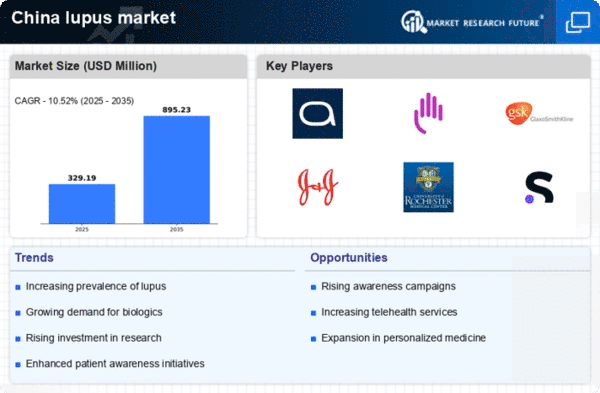Increasing Prevalence of Lupus
The rising incidence of lupus in China is a critical driver for the lupus market. Recent studies indicate that the prevalence of lupus has increased, with estimates suggesting that approximately 0.5 to 1.0 % of the population may be affected. This growing patient population necessitates enhanced healthcare services and treatment options, thereby expanding the market. The lupus market in China is likely to experience significant growth as healthcare providers and pharmaceutical companies respond to the increasing demand for effective therapies. Furthermore, the demographic shift towards an aging population may contribute to a higher incidence of autoimmune diseases, including lupus, further driving the market's expansion.
Expansion of Healthcare Infrastructure
The expansion of healthcare infrastructure in China is a vital driver for the lupus market. As the government invests in healthcare facilities and services, access to lupus diagnosis and treatment is improving. This expansion includes the establishment of specialized clinics and hospitals equipped to manage autoimmune diseases. The market is likely to benefit from increased patient access to healthcare services, which may lead to higher treatment rates and improved patient outcomes. Furthermore, the integration of lupus management into primary care settings is expected to enhance the overall healthcare experience for patients, thereby driving market growth.
Advancements in Diagnostic Technologies
Technological innovations in diagnostic tools are transforming the lupus market in China. Enhanced diagnostic capabilities, such as improved biomarker identification and imaging techniques, facilitate earlier and more accurate detection of lupus. This advancement is crucial, as timely diagnosis can lead to better management of the disease and improved patient outcomes. The market for diagnostic products is projected to grow, with estimates indicating a potential increase of 15 % annually. As healthcare providers adopt these advanced technologies, the lupus market is likely to benefit from increased patient referrals and a greater emphasis on early intervention strategies.
Growing Patient Advocacy and Support Groups
The emergence of patient advocacy and support groups is playing a pivotal role in shaping the lupus market in China. These organizations raise awareness about lupus, educate patients and healthcare professionals, and advocate for better healthcare policies. Their efforts contribute to increased visibility of the disease, which may lead to higher diagnosis rates and improved access to treatments. The influence of these groups is likely to drive market growth as they collaborate with pharmaceutical companies and healthcare providers to promote new therapies and enhance patient care. The active engagement of these organizations is essential for fostering a supportive environment for lupus patients.
Rising Investment in Research and Development
Investment in research and development (R&D) is a significant driver for the lupus market in China. Pharmaceutical companies are increasingly allocating resources to develop novel therapies and treatment modalities for lupus. This trend is supported by government initiatives aimed at fostering innovation in the healthcare sector. The R&D expenditure in the pharmaceutical industry has seen a substantial rise, with estimates suggesting an increase of over 20 % in recent years. As new therapies emerge, the lupus market is expected to expand, providing patients with more effective treatment options and improving overall disease management.
















